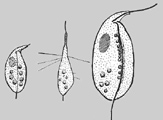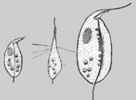Amastigomonas
Thecamonas
David J. Patterson- Amastigomonas bermudensis
- Amastigomonas debruynei
- Amastigomonas filosa
- Amastigomonas mutabilis
- Amastigomonas terricola
- Amastigomonas klosteria
- Amastigomonas gigantea
- Amastigomonas griebensis
- Amastigomonas marina
- Amastigomonas muscula
Introduction
Amastigomonas (also called Thecamonas (Larsen and Patterson, 1990)) is a very widespread and common genus. The genus has been reported from around the world, most records are from marine habitats, but it has also been reported from soils and freshwaters. The organism glides on the substrate with its anterior flagellum moving slightly. The genus eats bacteria, and food is ingested using pseudopodia that are produced by the ventral surface.
Twelve nominal species have been assigned to this genus, but a number of these are barely distinguishable and have been rendered into synonymy. The most detailed survey of the genus is that of Molina and Nerad (1991), and the most recent comments are those of Lee and Patterson (2000).
Characteristics
The species in this genus have the characters typical of all apusemonads. No generic synapomorphies have been found to date.
Discussion of Phylogenetic Relationships
Sister group relationships within the genus have not been explored. It may be that the genus is paraphyletic, and that Apusomonas cannot even serve as an outgroup.
References
De Saedeleer H. 1931. Nieuwe of wenig bekende Flagellaten. Naturwetenschapplijk Tijdschrift, 13, 89-96.
Larsen J. and Patterson D. J. 1990. Some flagellates (Protista) from tropical marine sediments. J. Nat. Hist., 24, 801-937.
Lee, W. J. and Patterson, D. J. 2000. Heterotrophic flagellates (Protista) from marine sediments of Botany Bay, Australia. Journal of Natural History, 34: 483-562.
Molina, F. I. and Nerad, T. A., 1991. Ultrastructure of Amastigomonas bermudensis ATCC 50234 sp.nov. - a new heterotrophic marine flagellate, European Journal of Protistology, 27, 386-396.
Patterson, D. J. 1999. The diversity of eukaryotes. American Naturalist 154: S96-124.
Title Illustrations

| Scientific Name | Amastigomonas debruynei, Amastigomonas filosa (2), Amastigomonas proboscidea (3) |
|---|---|
| Image Use |
 This media file is licensed under the Creative Commons Attribution License - Version 3.0. This media file is licensed under the Creative Commons Attribution License - Version 3.0.
|
| Copyright |
© 2000 David J. Patterson

|
About This Page
David J. Patterson

Marine Biological Laboratory, Woods Hole, Massachusetts, USA
Correspondence regarding this page should be directed to David J. Patterson at
dpatterson@mbl.edu
Page copyright © 2000 David J. Patterson
 Page: Tree of Life
Amastigomonas . Thecamonas .
Authored by
David J. Patterson.
The TEXT of this page is licensed under the
Creative Commons Attribution License - Version 3.0. Note that images and other media
featured on this page are each governed by their own license, and they may or may not be available
for reuse. Click on an image or a media link to access the media data window, which provides the
relevant licensing information. For the general terms and conditions of ToL material reuse and
redistribution, please see the Tree of Life Copyright
Policies.
Page: Tree of Life
Amastigomonas . Thecamonas .
Authored by
David J. Patterson.
The TEXT of this page is licensed under the
Creative Commons Attribution License - Version 3.0. Note that images and other media
featured on this page are each governed by their own license, and they may or may not be available
for reuse. Click on an image or a media link to access the media data window, which provides the
relevant licensing information. For the general terms and conditions of ToL material reuse and
redistribution, please see the Tree of Life Copyright
Policies.
- First online 18 September 2000
Citing this page:
Patterson, David J. 2000. Amastigomonas . Thecamonas . Version 18 September 2000. http://tolweb.org/Amastigomonas/20485/2000.09.18 in The Tree of Life Web Project, http://tolweb.org/









 Go to quick links
Go to quick search
Go to navigation for this section of the ToL site
Go to detailed links for the ToL site
Go to quick links
Go to quick search
Go to navigation for this section of the ToL site
Go to detailed links for the ToL site